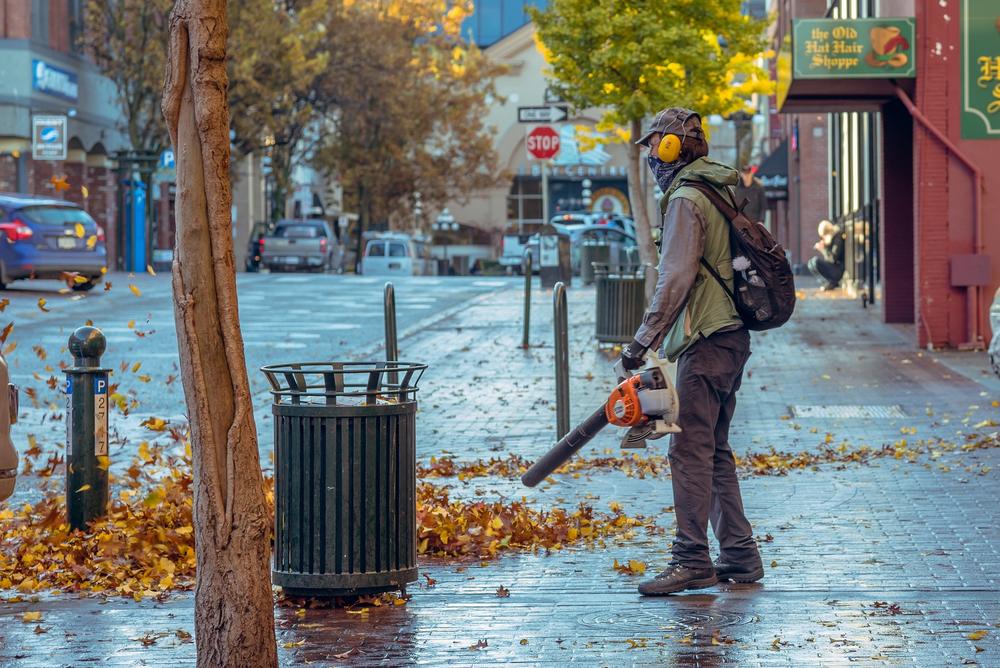
Section Branding
Header Content
Georgians survey landscape, say blower bill leaves a lot to be desired
Primary Content

With the 2023 legislative session soon to be a thing of the past, Georgia lawmakers are poised to pass a sweeping anti-discrimination measure into law.
Johns Creek Republican Sen. Shawn Still’s Senate Bill 145 aims to protect Georgia’s gas-powered leaf blowers from cities and counties that may seek to ban them in favor of electric blowers. A last-minute amendment would also offer similar protection to the state’s gas appliances.
The bill would not have any effect on the products homeowners use to clear off their yards and driveways, nor would it have any say on what equipment places like schools, hospitals and neighborhood associations could employ. Local governments would still be able to place restrictions on leaf blowing such as banning blowers before and after certain hours, but the rules would have to apply equally to gas and electric-powered blowers.
“A gas blower will be able to do the job in a fraction of the time of an electric blower, and this is simply a preemptive bill to ensure that we’re allowing time for technology to catch up, and that we can try to eventually try to phase out two-cycle engines until science and manufacturing gets us there,” Still said.
To that end, the Senate amended the bill to include a sunset clause allowing elected officials to throttle down two-cycle gas-powered leaf blowers starting in 2031.
“The senator from the 48th has been so accommodating and been wonderful to work with to address some of the concerns that my constituents have about this particular piece of legislation, so first of all, I wanted to thank him,” said Sen. Elena Parent, an Atlanta Democrat who offered the amendment with Still.
Parent, who did not vote for the bill, said it was important to her constituents that it at least have an expiration date because of their concerns about noise pollution as well as regular pollution, both of which can be exacerbated in densely populated areas like Atlanta.
A couple weeks after the bill passed the Senate, a House committee removed the sunset provision at the request of Hartwell Republican Rep. Alan Powell and approval of Still.
“I believe that my chamber would be very happy with that,” Still said. “I would say that also because the senator that suggested and co-signed the amendment with me on our floor then voted against it anyway, so it didn’t really move any hearts or minds with the amendment on the sunset.”
The bill could receive a House vote Monday or Wednesday, the penultimate and ultimate days of the session. Because of the amendment, it must also go back for another Senate vote before it can arrive on Gov. Brian Kemp’s desk.
But there are those who would stand between Georgia’s gas-powered leaf blowers and the proposed legal protections, including Democratic lawmakers who argue that no Georgia cities or counties ban gas-powered leaf blowers.
“Are there any cities or counties in Georgia that have imposed some limitation on leaf blowers?” asked Decatur Democrat Mary Margaret Oliver at a recent hearing.
“They have tried,” Still answered.
“What does that mean?” Oliver asked.
“It means that they have been discussing it, and it’s come up several times in the last two years,” said Still.
“Has anybody had a vote up or down?” asked Oliver.
“I don’t believe it’s gotten that far,” Still said.
“So it’s probably a premature discussion then that you’re bringing to us,” Oliver said.
“I wouldn’t say it’s premature discussion. I would say that we’re being preemptive with it, but premature, I’m not sure if I would use that word to describe it,” said Still.
St. Marys Republican Rep. Steven Sainz attempted to frame the issue in a way that was more understandable to Oliver, an attorney.
“Would you say if there were cities who are on official record for the idea of banning legal pads or notaries, you think we’d probably have a couple of attorneys who would probably want a preemption clause for the state to make sure that their industry were to stay safe?” he asked.
Bryan Tolar with the Georgia Urban Agriculture Council, which lobbied for the bill, said gas blower bans are popping up around the country.
“Businesses that are concerned about what they’re seeing in other states — 19 states have at least one city or county that have put restrictions in place for gasoline power leaf blowers,” he said. “Washington, D.C. — a total ban. So it’s not about does it happen, we know it happens. The city of Dallas, Texas, is reviewing an ordinance right now to do the very same thing. We want to keep that from happening in Georgia.”
Powell argued that it is incumbent upon the state Legislature to gently guide local governments when they are in danger of making unwise decisions like banning certain types of leaf blowers.
“The local governments, sometimes there’s an overreach,” he said. “They get petitioned by certain citizens that don’t like to hear the sharp noise and all. But this is another case of the lack of common sense and some things. It’s something like this that we have to preempt.”
Several Georgians who don’t like to hear sharp noises were present at committee hearings discussing the bill. Many alleged the noise from the efficient foliage removers interrupts their babies’ naps, makes Zoom meetings impossible to hear and forces outdoor to-dos indoors.
Atlanta retiree Ben Terry said he is beset on all sides from landscaping companies blowing up miniature hurricanes in his neighbors’ yards.
“My wife and I do not even notice the mowers, the edgers, the trimmers,” he said. “The only thing we notice is the gas-powered leaf blowers, and they’re going three at a time, and they are ruining our quality of life. Everything you’ve heard about running three at a time is true. We can’t use our deck, we can’t use our patio. We can’t schedule any outdoor event, because guaranteed there will be three on one side and three two lots down running the gas blowers.”
But the bill has powerful supporters, including the Georgia Hispanic Chamber of Commerce.
President and CEO Veronica Maldonado Torres said most of the landscaping businesses across the state are owned by Hispanic businessmen and women.
“Many of them are small businesses with 10 or less employees,” she said. “In a recent national survey, switching over from gas to battery powered landscape equipment for a business can cost an average of 30% more than the current operating cost for equipment and labor, with many of the initial buying costs doubling for battery powered equipment than gas powered equipment.”
Lawmakers use the term Christmas tree to describe a bill that has been festooned with amendments with questionable relevance to the original subject matter. Still, a freshman, showed he was in on the joke Thursday when he was seen in the Capitol with a little green Christmas tree pin stuck to his lapel.
Among the decorations stuck to Still’s tree bill are:
- Woodstock Republican Rep. Brad Thomas’ House Bill 374, which provides a new way for small groups of city residents to deannex their properties
- A revision to a zoning bill passed last year
- HB 206, a bill by Sainz creating county bodies called Commercial Property Assessed Conservation, Energy Resiliency Development Authorities
- Rep. Victor Anderson’s House Bill 438, which prevents municipalities from restricting gas appliances.
This story comes to GPB through a reporting partnership with Georgia Recorder.

